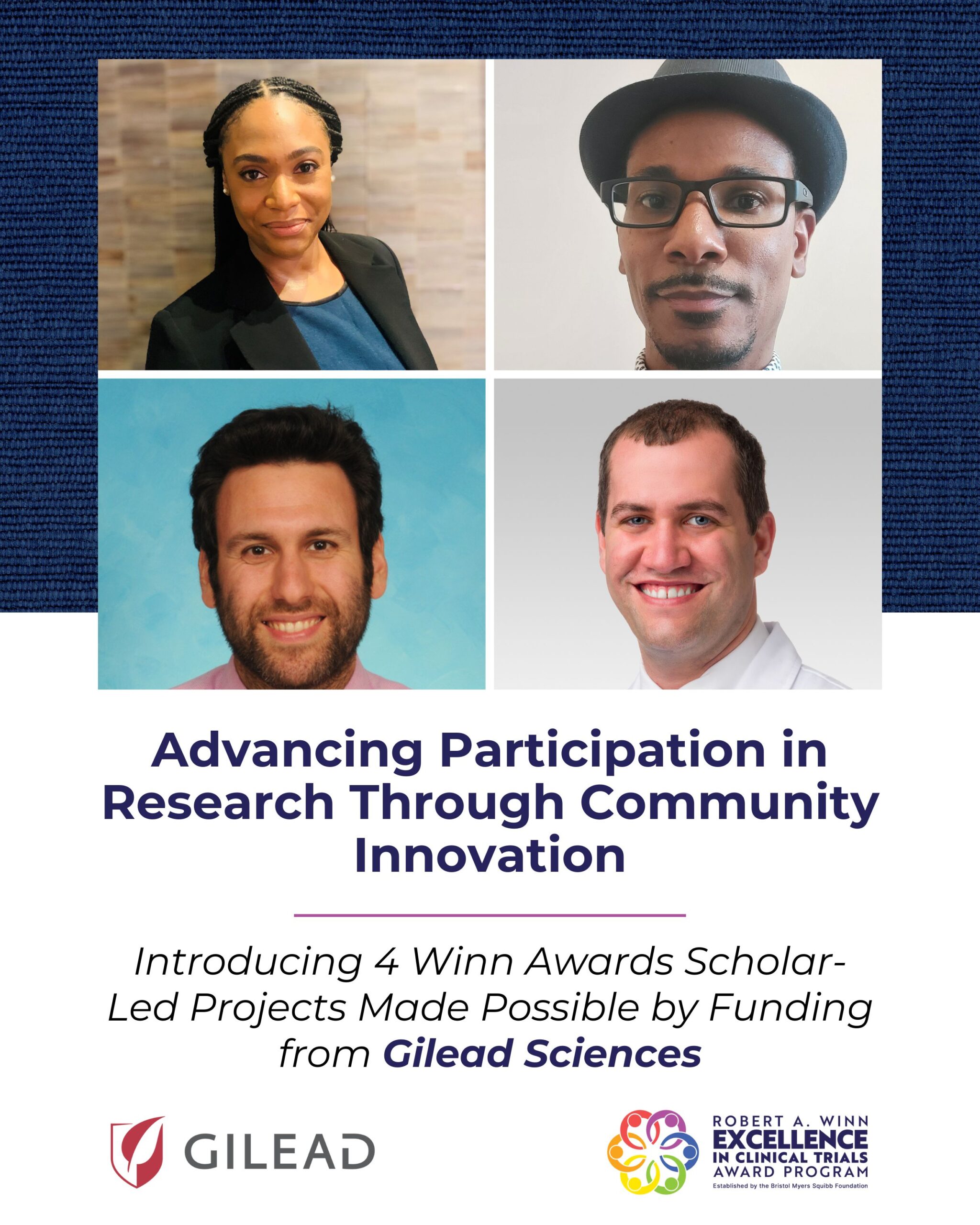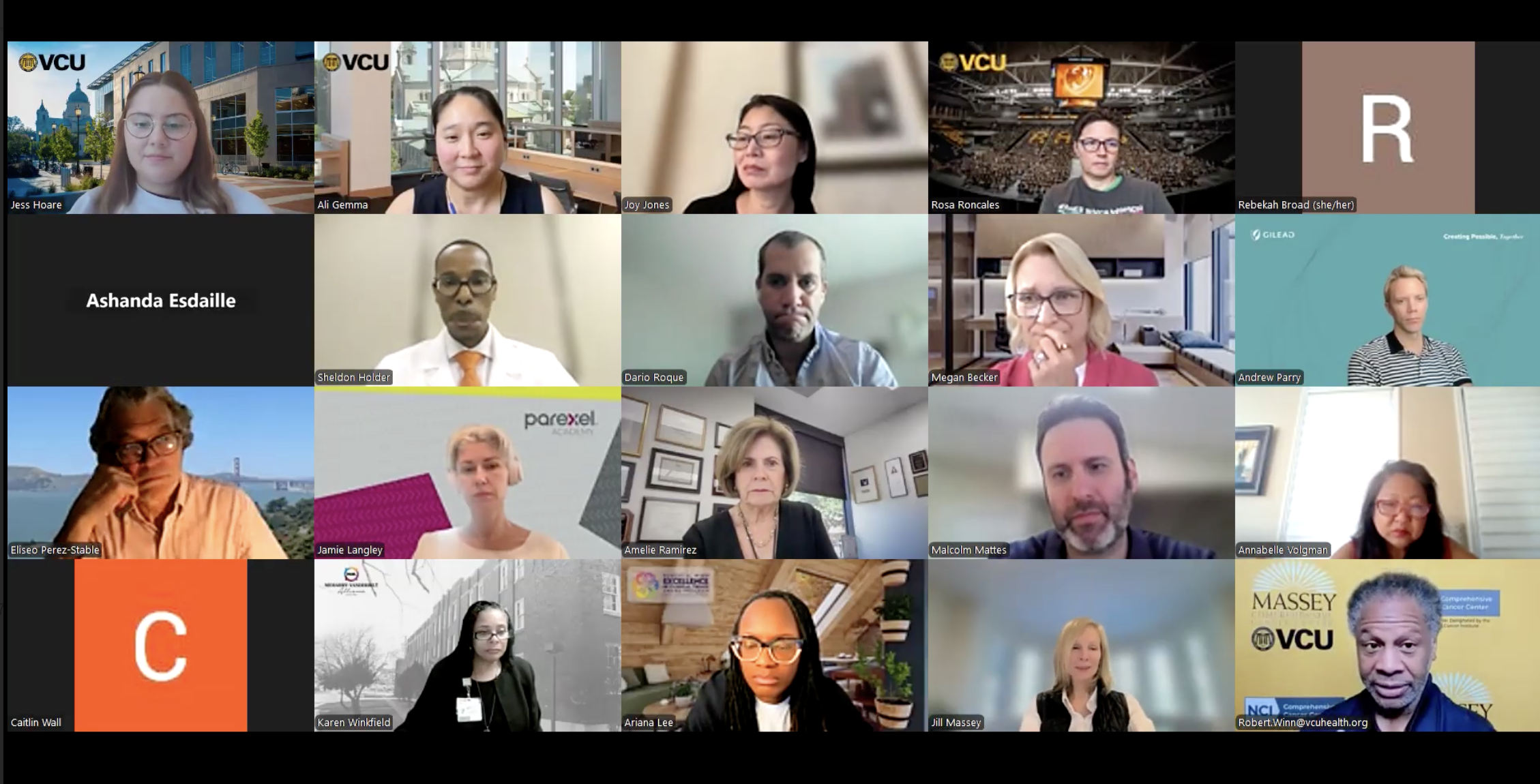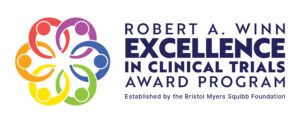
(From top left to bottom right) Dr. Ashanda Esdaille – HEAL-CARE: Healthy Eating and Learning for Cancer Awareness, Research, and Education | Dr. Sheldon Holder – The Color of Cancer: Storytelling and Cancer Talk Cafés | Dr. Malcolm Mattes – Decision Aid for PSA Screening Shared Decision-Making | Dr. Dario Roque – IMPACT Chicago: Clinical Trial Finder and Community Partnerships in GYN Oncology
Introducing Four Winn Awards Scholar-Led Projects That Are Driving Change in Clinical Trials
Funded by Gilead Sciences, the Community Innovation Grant in Oncology is a compelling offering of the Robert A. Winn Excellence in Clinical Trials Award program (Winn Awards), empowering early-stage researchers to design community-driven solutions that expand access to cancer care and research. By combining scientific expertise with deep community partnerships, these initiatives are creating practical, replicable models for building trust, breaking down barriers, and increasing participation in clinical trials.
In a recent series of presentations, scholars shared updates on their projects with an audience that included community partners, Gilead representatives, members of the Winn Awards National Advisory Committee, and program namesake Dr. Robert A. Winn. Each presentation highlighted real-world impact, lessons learned, and strategies for sustainability — together underscoring the essential role of community engagement in advancing cancer prevention, treatment, and research for all people.
The Winn Awards and Gilead Sciences teams are proud to share highlights from the four projects presented, each offering a unique approach to advancing participation in clinical trials.
HEALCARE: Healthy Eating and Learning for Cancer Awareness, Research, and Education
Black men in Georgia face one of the nation’s highest prostate cancer burdens, compounded by food insecurity, adverse food environments, and mistrust of clinical research. The HEAL-CARE program, launched and led by Dr. Ashanda Esdaille in Augusta, Georgia, addresses these challenges by combining nutrition education with cancer awareness and clinical trial literacy.
In collaboration with The HUB teaching kitchen, Augusta Locally Grown, and Ebony Tree Farms, participants attended plant-forward cooking sessions while learning about prostate cancer risk and the importance of clinical trial participation. Surveyed men reported a 40% increase in familiarity with plant-based nutrition, greater confidence cooking at home, and an improved understanding of clinical trials. Retention reached 81%, with one participant reporting resolution of chronic migraines after program completion.
Dr. Esdaille says some of the lessons learned during the implementation of this initiative included the importance of scheduling flexibility, tailoring engagement strategies (such as involving women partners), and aligning sites more closely with Black communities. She also says that the sustainability of this project is strong: the MCG Foundation has pledged matching support, while additional grants and partnerships are expanding the program’s reach.
The Color of Cancer: Storytelling and Cancer Talk Cafés
In Rhode Island, Dr. Sheldon Holder has launched initiatives to reduce stigma, build trust, and normalize conversations about cancer. Guided by a community advisory board, the project featured two key elements:
- Cancer Talk Cafés: informal, relationship-first conversations without signups or presentations.
- The Color of Cancer: a storytelling project capturing lived experiences of survivors, caregivers, and community leaders.
A seven-story documentary, now in post-production, will premiere locally before being submitted to film festivals. The team is also producing short-form content for digital platforms. The project emphasizes non-extractive, authentic storytelling as a foundation for trust and eventual clinical trial participation.
Transitioning leadership to Dr. Sherise Rogers, the project has secured hosting support through 2026 and is actively pursuing additional marketing and distribution funding.
Decision Aid for PSA Screening Shared Decision-Making
To address gaps and challenges in prostate cancer screening, Dr. Malcolm Mattes in Newark, New Jersey, developed and tested a culturally and linguistically tailored decision aid for Black and Hispanic men. Co-designed with oncologists, primary care physicians, and patient advocates, the tool was tested with 100 participants at Rutgers University Hospital.
Results showed men who used the decision aid felt more informed, were more satisfied with their screening choices, and were more willing to consider treatment if diagnosed. Importantly, actual PSA testing rates were far higher in the decision aid group (58%) compared to the control group (16%).
In the future, Dr. Mattes plans to scale the program across multiple institutions, extend follow-up to assess long-term outcomes, and develop complementary provider training to enhance shared decision-making quality.
IMPACT Chicago: Clinical Trial Finder and Community Partnerships in GYN Oncology
Minority women remain severely underrepresented in gynecologic oncology trials. To address this, Dr. Dario Roque launched IMPACT Chicago, a cross-institutional clinical trial finder supported by navigation services and strengthened through deep partnerships with community-based organizations (CBOs) such as Sisters Working It Out, ALAS, and the Puerto Rican Cultural Center.
Bilingual workshops covered the basics of clinical trials while also addressing related topics prioritized by community partners, such as genetics and financial planning. Surveys showed dramatic increases in participants’ knowledge and confidence: African American participants reported a jump from 50% to 94% in confidence making trial decisions, while Hispanic participants achieved 100% agreement that trial participation benefits both self and others.
Despite barriers such as immigration-related fears and funding cuts at partner organizations, the project demonstrated the power of CBO-led programming to build trust and engagement. Sustainability plans include continued workshops, navigation supports, and expanded partnerships.
Investment, Innovation, and Community Engagement – A Powerful Combination
These four scholar-led projects highlight what it truly takes to advance participation in clinical trials: trusted community partnerships, culturally resonant communication, structural supports that meet people where they are, and strategies that ensure sustainability beyond the life of a single grant.
Whether through the power of storytelling, the guidance of decision aids, the promise of nutrition education, or the reach of community navigation, each project demonstrates how innovation combined with community engagement can transform the future of cancer prevention, treatment, and research. These grants are one more way the Winn Awards are advancing Better Science For All.


